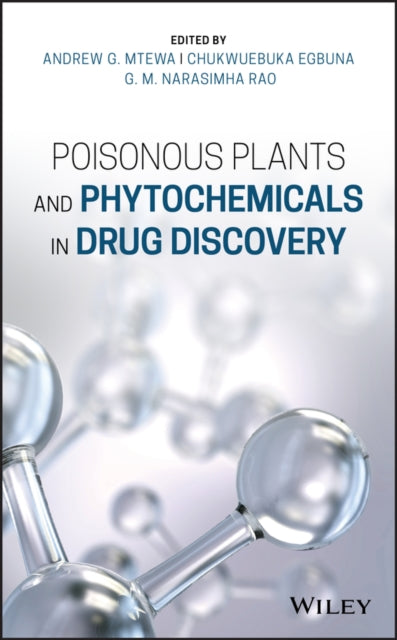Shulph Ink
Poisonous Plants and Phytochemicals in Drug Discovery
Poisonous Plants and Phytochemicals in Drug Discovery
YOU SAVE £16.66
- Condition: Brand new
- UK Delivery times: Usually arrives within 2 - 3 working days
- UK Shipping: Fee starts at £2.39. Subject to product weight & dimension
Bulk ordering. Want 15 or more copies? Get a personalised quote and bigger discounts. Learn more about bulk orders.
Couldn't load pickup availability
- More about Poisonous Plants and Phytochemicals in Drug Discovery
This book provides a comprehensive resource on poisonous plants and their applications in chemistry and pharmacology, covering historical perspectives, modern applications, and potential in drug discovery. It is an ideal resource for academic researchers and industry professionals.
Format: Hardback
Length: 432 pages
Publication date: 25 February 2021
Publisher: John Wiley and Sons Ltd
This book is a comprehensive resource on poisonous plants and their applications in chemistry and pharmacology, focusing on phytochemicals and their potential for drug discovery. It provides a detailed exploration of phytotoxins, covering historical perspectives, modern applications, and their potential in drug discovery. The book delves into the mechanisms, benefits, risks, and management protocols of phytotoxins in a scientific laboratory, emphasizing their usefulness in drug discovery. Organized in a carefully designed and clear order, the chapters cater to both academic researchers and industry professionals at any stage of their career.
Phytochemicals, the active compounds found in plants, have been a rich source of inspiration for drug discovery. These natural products offer unique properties and structures that can be exploited to develop new therapeutic agents. One area of particular interest is the study of phytotoxins, which are toxic substances produced by plants to defend themselves against predators or to prevent the spread of disease.
Phytotoxins have been used for centuries in traditional medicine and have shown promising results in treating various diseases. For example, the alkaloid nicotine, found in tobacco, is a highly addictive substance that is also used in nicotine replacement therapies to help smokers quit. Another example is the cardiac glycoside digoxin, which is used to treat heart failure and irregular heart rhythms.
However, the use of phytotoxins in drug discovery also presents challenges. These compounds can be highly toxic and can have adverse effects on human health. Therefore, it is essential to carefully evaluate the safety and efficacy of phytotoxins before they can be used as therapeutic agents.
One approach to addressing these challenges is to isolate and characterize the active components of phytotoxins and to develop synthetic analogs that are less toxic and more effective. This can be achieved through various techniques, such as chromatography, mass spectrometry, and molecular modeling.
Another approach is to use plant-based extracts or compounds as starting materials for drug discovery. These natural products can be more readily available and less expensive to produce than synthetic compounds, and they may have fewer side effects.
In addition to their potential as therapeutic agents, phytotoxins have also been used in other fields, such as agriculture and food safety. For example, some phytotoxins can be used as pesticides to control pests or as natural preservatives to extend the shelf life of food products.
However, it is important to note that the use of phytotoxins in these fields should be carefully regulated to ensure that they are used safely and effectively.
In conclusion, phytochemicals and their potential for drug discovery offer a promising avenue for developing new and innovative therapeutic agents. However, it is essential to approach this field with caution and to carefully evaluate the safety and efficacy of these compounds before they can be used as therapeutic agents. By isolating and characterizing the active components of phytotoxins and developing synthetic analogs, we can harness the potential of these natural products while minimizing the risks to human health.
Weight: 648g
Dimension: 235 x 203 x 23 (mm)
ISBN-13: 9781119650232
This item can be found in:
UK and International shipping information
UK and International shipping information
UK Delivery and returns information:
- Delivery within 2 - 3 days when ordering in the UK.
- Shipping fee for UK customers from £2.39. Fully tracked shipping service available.
- Returns policy: Return within 30 days of receipt for full refund.
International deliveries:
Shulph Ink now ships to Australia, Belgium, Canada, France, Germany, Ireland, Italy, India, Luxembourg Saudi Arabia, Singapore, Spain, Netherlands, New Zealand, United Arab Emirates, United States of America.
- Delivery times: within 5 - 10 days for international orders.
- Shipping fee: charges vary for overseas orders. Only tracked services are available for most international orders. Some countries have untracked shipping options.
- Customs charges: If ordering to addresses outside the United Kingdom, you may or may not incur additional customs and duties fees during local delivery.


